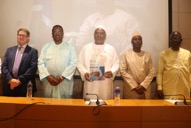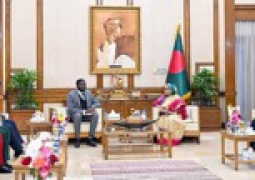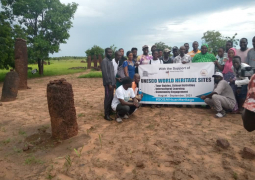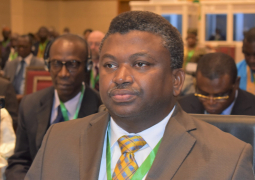
The initiative, courtesy of the Ministry of Public Service in collaboration with the Office of the President and Tony Blair Institute for Global Change alongside key partners, seeks to boost the operation efficiency of the Port of Banjul, while re-positioning it as a hub in promoting trade and businesses.
In addition, the initiative further seeks to enhance trade efficiency and logistics while representing a crucial step towards improving the trade framework in The Gambia, fostering economic growth and creating a unified trading environment.
In essence, it serves as a tool in bringing accessibility to the country’s trade ecosystem, thus fostering coordination, cooperation and consultation among industry stakeholders.
At the launch, Muhammed B.S Jallow, vice president of The Gambia on behalf of the Gambian leader, while describing the initiative as historic, acknowledged that the move presents critical steps towards transforming the country’s trade ecosystem as well as positioning it better to continue its ongoing pursuit towards economic growth and prosperity.
The Port of Banjul, which serves as the country’s primary gateway to the world, has been facing significant challenges in recent years.
“These challenges, including aging infrastructure and inefficiencies in operations, have contributed to a worrying decline in trade traffic and revenue.”
Recognising the urgency of the matter, he said, the government is committed to addressing these challenges head-on, affirming that over and above “our investment partnership with Albayrak seeks to improve the infrastructure at the Port of Banjul and build a new deep seaport in Sanyang.”
“The Office of the President in partnership with the key ministries responsible for overseeing trade and logistics ecosystem and the relevant downstream agencies that include the Gambia Revenue Authority and the Gambia Ports Authority, and with the invaluable support of the Tony Blair Institute for Global Change, we have developed this Trade Logistics Charter.”
This charter, he added, will act as a foundation for improving the operational efficiency of “our port and trade ecosystem, ensuring we not only regain lost revenue, but also secure a brighter, more competitive future for The Gambia.”
Vice President Jallow noted that the Trade Logistics Charter is more than just a document; it is a framework that binds all stakeholders within the trade community.
“Today marks the official beginning of the next phase. We will today establish the Trade Logistics Council, which will be tasked with overseeing the implementation of this Charter, ensuring we meet our targets, and reporting on our progress. The KPIs will be continuously monitored by my delivery unit who will see to it that there is active engagement with all stakeholders to keep the momentum going.”
For his part, Frank Matsaert representing the Tony Blair Institute for Global Change, described the charter as a great achievement for the country, acknowledging that the initiative seeks to bring all stakeholders on board and help transform trade ecosystem.
He noted that it has the capacity to also modernise it and make it easier.
This, he added, can happen “if we all collaborate and work towards making it a reality.”
Alieu Loum, permanent scretary at the Ministry of Public Service Administrative Reform Policy Coordination and Delivery, described the initiative as “timely and relevant” in their broader quest to reshape the country’s trade ecosystem.
PS Loum acknowledged that this Charter also seeks to unlock new growth opportunities designed to overhaul trade infrastructure streamline process while positioning The Gambia as competitive force in the global stage.
Meanwhile, this Trade Charter, according to officials, is a critical framework that commits all trade community stakeholders to deliver specific key performance indicators (KPIs) determined via a scientific process. Thus, their collective efforts will lead to effectiveness, reliability, and global competitiveness of the Port of Banjul including customs and the trade corridor leading into the hinterland. Further, the anticipated changes in the way of work will also be carried over to the Sanyang Port investment once those operations come on stream.
The event, which attracted cabinet ministers and senior government officials, also saw a visual presentation as well as unveiling charter.





